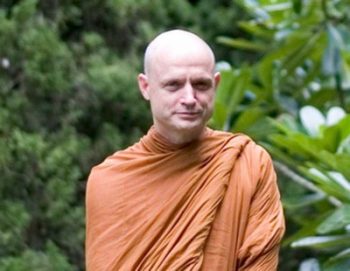Ajahn Jayasaro : Chanda, the right motivation
 The Buddha spoke of two kinds of desire: desire that arises from ignorance and delusion, which is called tanha, craving, and desire that arises from wisdom and intelligence, which is called kusala-chanda, or dhamma-chanda, or most simply chanda. Chanda has a range of meanings, but in this case I’m using it to mean wise and intelligent desire and motivation, which the Buddha stressed as being absolutely fundamental to any progress on the eightfold path.
The Buddha spoke of two kinds of desire: desire that arises from ignorance and delusion, which is called tanha, craving, and desire that arises from wisdom and intelligence, which is called kusala-chanda, or dhamma-chanda, or most simply chanda. Chanda has a range of meanings, but in this case I’m using it to mean wise and intelligent desire and motivation, which the Buddha stressed as being absolutely fundamental to any progress on the eightfold path.
In the presence of chanda, effort, or viriya, arises. Effort is in many ways the characteristic dhamma of this whole school of buddhism. In fact, the Buddha referred to his teachings not as Theravada but as viriya-vada. It is a teaching of effort, a teaching that there is such a thing as effort, that effort can be put forth, effort should be put forth, and that effort is what is needed for progress on the path. (…/)
The ability to put forth effort depends a great deal on chanda. When you start any meditation period, it’s important to recognize that chanda is not always there. Even for monks and nuns, people who are giving their lives to this practice, the sense of chanda fluctuates. If you lack that sense of interest and chanda—that uplift and enthusiasm for practice—the meditation can very quickly grind to a halt or run into quicksand. You have serious problems. That’s why I think it’s worth checking the amount of interest at the beginning of a meditation, and if it’s lacking, you need to be willing to spend some time cultivating it, bringing it up. The more you apply yourself in this way, the more fluent you will be in cultivating chanda, and the more easily you can do it, until it becomes almost automatic.
One of the simplest ways of doing this is to reflect on two subjects. The first is the suffering inherent in the lack of mindfulness, inner peace, and wisdom. We can draw upon particular areas or events in our lives that have caused us great distress, or distress to others, and see very plainly their results, such as a lack of inner awareness, mindfulness, and inner discipline. We can also draw upon the experiences of the people we know and how they have particularly affected us.
The second way of using the thinking mind is to reflect upon all the blessings of mindfulness, inner peace, wisdom, and compassion. Perhaps we can call to mind the examples of great monks, nuns, and teachers whom we admire, and how much we revere their peace, calm, kindness, compassion, and wisdom. We can remind ourselves that they are not the owners of these qualities, that they weren’t born with these qualities, but rather that these qualities manifested in them through effort and that great teachers are vessels for beautiful, noble qualities. And just as they are vessels, so too can we be vessels. Having been born as a human being, we have within us the capacity to manifest every noble quality and must try to do so.
Buddhadharma 2014

Laisser un commentaire